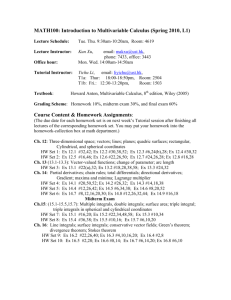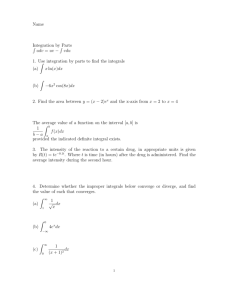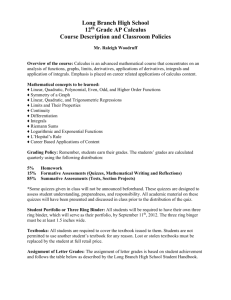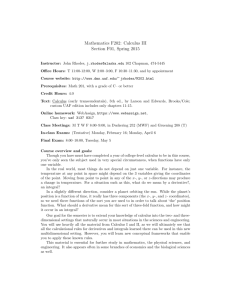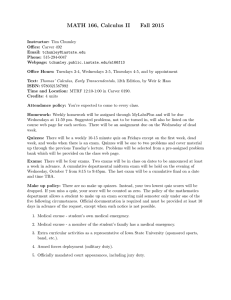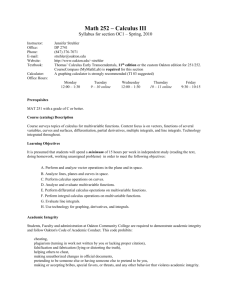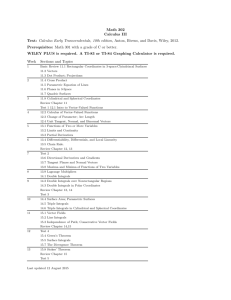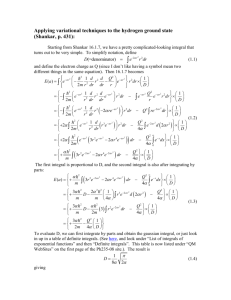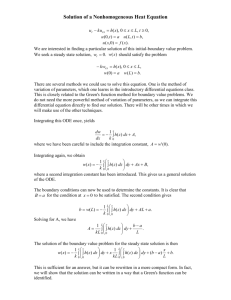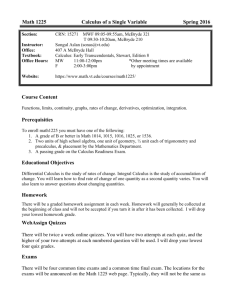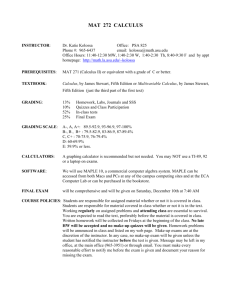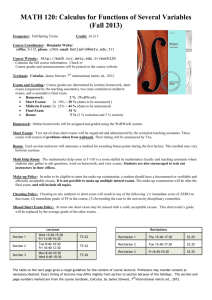Multivariable Calculus
advertisement
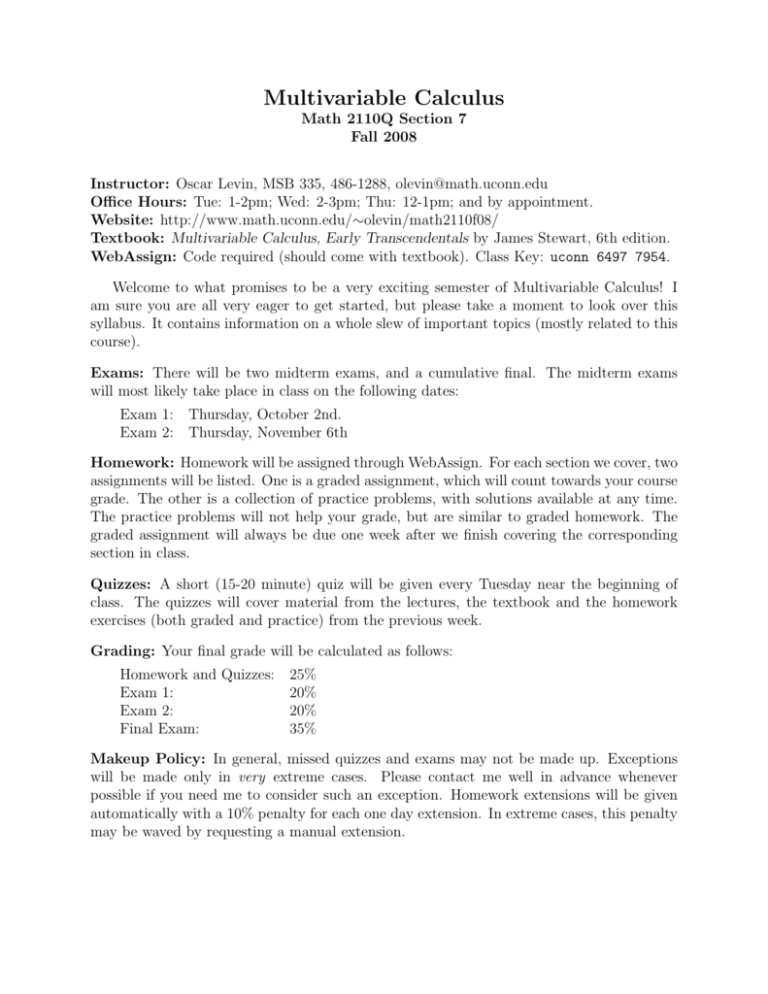
Multivariable Calculus Math 2110Q Section 7 Fall 2008 Instructor: Oscar Levin, MSB 335, 486-1288, olevin@math.uconn.edu Office Hours: Tue: 1-2pm; Wed: 2-3pm; Thu: 12-1pm; and by appointment. Website: http://www.math.uconn.edu/∼olevin/math2110f08/ Textbook: Multivariable Calculus, Early Transcendentals by James Stewart, 6th edition. WebAssign: Code required (should come with textbook). Class Key: uconn 6497 7954. Welcome to what promises to be a very exciting semester of Multivariable Calculus! I am sure you are all very eager to get started, but please take a moment to look over this syllabus. It contains information on a whole slew of important topics (mostly related to this course). Exams: There will be two midterm exams, and a cumulative final. The midterm exams will most likely take place in class on the following dates: Exam 1: Exam 2: Thursday, October 2nd. Thursday, November 6th Homework: Homework will be assigned through WebAssign. For each section we cover, two assignments will be listed. One is a graded assignment, which will count towards your course grade. The other is a collection of practice problems, with solutions available at any time. The practice problems will not help your grade, but are similar to graded homework. The graded assignment will always be due one week after we finish covering the corresponding section in class. Quizzes: A short (15-20 minute) quiz will be given every Tuesday near the beginning of class. The quizzes will cover material from the lectures, the textbook and the homework exercises (both graded and practice) from the previous week. Grading: Your final grade will be calculated as follows: Homework and Quizzes: 25% Exam 1: 20% Exam 2: 20% Final Exam: 35% Makeup Policy: In general, missed quizzes and exams may not be made up. Exceptions will be made only in very extreme cases. Please contact me well in advance whenever possible if you need me to consider such an exception. Homework extensions will be given automatically with a 10% penalty for each one day extension. In extreme cases, this penalty may be waved by requesting a manual extension. Calculator Policy: You may use calculators in this course, even on quizzes and exams. However, don’t be seduced by your calculators ability to do some of the computations taught in this course. You will still have to show all your work on quizzes and exams, so make sure you can do all the problems by hand. Classroom Policies: Please be considerate of your fellow classmates and do not act in a disruptive manor. Turn off your cell phones and mp3 players before coming to class, arrive on time, and do not pack up your things before the end of class. If you need to leave the room for any reason (like using the restroom) please do so as quietly as possible. Academic Integrity: Don’t cheat! Any infraction on graded work will result in a 0 for that assignment, quiz, or exam, possibly an “F” for the course, and a letter sent to the Dean of Students. If you are not sure what counts as cheating, please refer to the Student Code. When in doubt, don’t do it! Suggestions for a Successful Semester: • Think critically! Don’t believe something just because I tell you that it’s true. Always ask yourself if you have good reason to believe it. • Read each section before I talk about it in class. Doing so will make it easier to take notes and help you identify the questions you should ask. • Do all the assigned homework, and if you have time, some problems that were not. • A terrific way to learn math is to work with other students in the class, and I encourage you to do so. However, if a friend shows you how to do a homework problem, it is a good idea to find a similar problem to try on your own. Remember, you won’t have that friend come test time. • Never eat eggs which have passed the expiration date. • Bring your copy of the textbook to class. As time permits, we will discuss homework problems, so being able to look in the book will be helpful. Also, bring your graphing calculator. (TI83 recommended, but others work too). And paper and pencil. • If you need help, come see me in my office during the hours listed above or make an appointment with me for some other time. • Extra help is available at the Q-Center in the Library. • If you need non-math related help, you could try Counseling and Mental Health Services (486-4705), Alcohol and Other Drugs Services (486-9431), and the Dean of Students Office (486-3426). • Most importantly, if you don’t understand something: ASK! Tentative Schedule: Week Sections Week 1 12.1, 12.2, (8/26, 8/28) 12.3 Week 2 12.4, 12.5, (9/2, 9/4) 12.6 Week 3 13.1, 13.2, (9/9, 9/11) 13.4 Week 4 14.1, 14.3, (9/16, 9/18) 14.4 Week 5 14.5, 14.6, (9/23, 9/25) 14.7 Week 6 — (9/30, 10/2) Week 7 14.8, 15.1, (10/7, 10/9) 15.2 Week 8 15.3, 15.4 (10/14, 10/16) Week 9 15.6, 15.7, (10/21, 10/23) 15.8 Week 10 15.9, 16.1 (10/28, 10/30) Week 11 — (11/4, 11/6) Week 12 13.3, 16.2 (11/11, 11/13) Week 13 16.3, 16.4, (11/18, 11/20) 16.5 11/22 - 11/30 No Class Week 14 – (12/2, 12/4) Topics Three-dimensional coordinate systems, vectors, and the dot product. The cross product, equations of lines and planes, and cylinders and quadric surfaces. Vectors and space curves, derivatives and integrals of vector functions, velocity and acceleration. Functions of several variables, partial derivatives, and tangent planes. The chain rule, directional derivatives, the gradient vector, and maximum and minimum values Review Exam 1: Thursday, October 2nd Lagrange multipliers, double integrals over rectangles, and iterated integrals. Double integrals over general regions and double integrals in polar coordinates. Triple integrals and triple integrals in, cylindrical and spherical coordinates. Change of variables in multiple integrals, vector fields Review Exam 2: Thursday, November 6th Arc length and line integrals. The Fundamental Theorem for Line Integrals, Green’s Theorem, Curl and Divergence Thanksgiving Break Review
